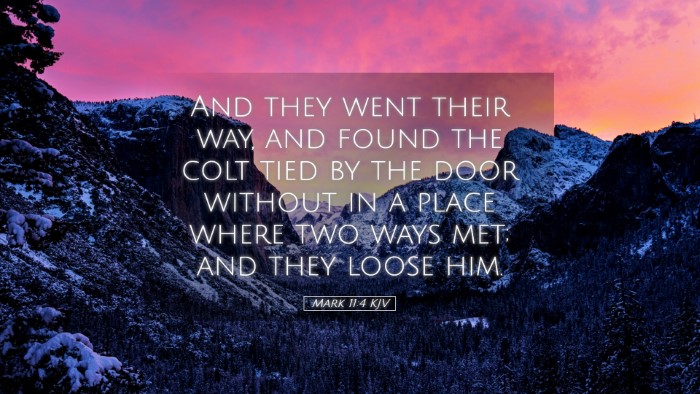Commentary on Mark 11:4
Mark 11:4 (KJV): "And they went their way, and found the colt tied by the door without in a place where two ways met; and they loose him."
Introduction
This passage in Mark 11:4 describes the event surrounding the *Triumphal Entry* of Jesus into Jerusalem. The narrative not only sets the stage for one of the most pivotal moments in Christian history but also encapsulates themes of obedience, prophetic fulfillment, and the significance of Jesus' ministry.
Significance of the Colt
Matthew Henry emphasizes the importance of the colt, which had never been ridden. In ancient Jewish tradition, animals designated for sacred purposes were to be unblemished and unused. By choosing a young colt, Jesus fulfilled the prophecy of Zechariah 9:9, which proclaims the King coming in humility, riding on a donkey.
Albert Barnes comments that the detailed instructions for retrieving the colt serve as a demonstration of Jesus’ divine authority and foreknowledge. The phrase “in a place where two ways met” alludes to God's providence and the divine orchestration of events leading to Christ’s entry into Jerusalem.
Obedience in Action
The act of the disciples going to fetch the colt highlights obedience to the directives given by Jesus. Adam Clarke notes that the disciples did not question the command, which speaks to their faith in Jesus’ authority and his prophetic insight. This obedience is a model for believers, showcasing the importance of acting on God's word, even amidst uncertainty.
This obedience also reflects the disciples' evolving roles as they move from followers to active participants in the unfolding kingdom narrative. For pastors and theologians, the disciples' readiness to act serves as a call to ministry and service in faith.
Prophetic Fulfillment
Mark 11:4 connects to broader biblical prophecies, particularly those found throughout the Old Testament. Henry indicates that Christ’s desire to ride into Jerusalem in such a manner not only fulfills prophecy but also challenges the societal expectations of a triumphant king. Rather than a warrior on a steed, Jesus approaches as a humble servant, reinforcing the nature of His kingship.
Barnes elaborates on this by suggesting that the manner of Jesus' entry is a direct contrast to worldly notions of power and authority. His choice to ride a donkey symbolizes peace as opposed to conquest, creating a framework for understanding Jesus’ mission as one of reconciliation rather than oppression.
Theological Implications
The act of untying the colt can be seen as symbolic of liberation. According to Clarke, these events can reflect the spiritual liberation Jesus offers to all who follow Him. Just as the colt is set free, so too are believers liberated from the bindings of sin and death. This imagery reinforces the gospel message of salvation and the freedom found in Christ.
The fulfillment of such prophecies urges the reader to reflect on the divine sovereignty at play. Jesus' knowledge of the colt's location emphasizes that nothing is outside God’s control. This theological understanding is critical for scholars and students who seek to grasp the cohesive narrative of scripture.
Conclusion
Mark 11:4 encapsulates essential themes of obedience, prophecy, and divine authority. This brief yet profound passage calls believers to recognize Jesus’ kingship and to engage in faithful service. For pastors, this text can serve as a source of inspiration for preaching on the nature of Christ’s humility and the call to obedience in their congregations.
Furthermore, theologians and scholars should appreciate the depth of this narrative as it relates to Old Testament prophecies and the overall march towards the crucifixion and resurrection. Through the imagery of the colt and the angels’ proclamation, the profound layered meaning of this passage invites reflection on the nature of Christ's ministry and His redemptive work in the world.


